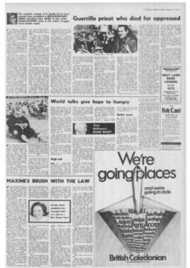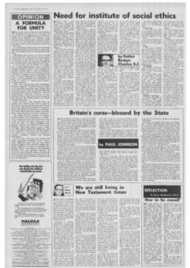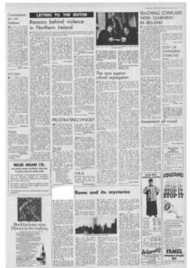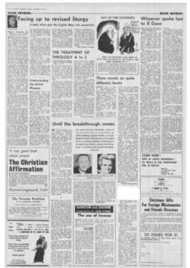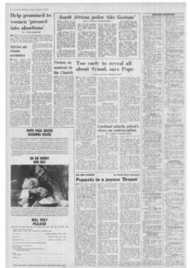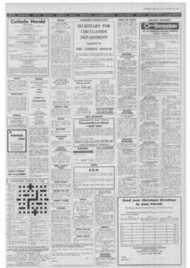Page 4, 19th November 1971
Page 4
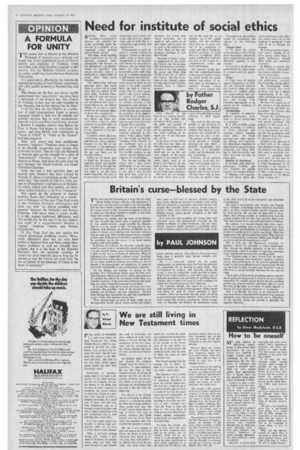
Report an error
Noticed an error on this page?If you've noticed an error in this article please click here to report it.
Tags
Share
Related articles
Sense And Censorship
Knock The 'bookies' And Bingo
Paul Johnson's Farewell To Trendiness
The Callous Views Of Mr. Crossman
Douglas Hyde's Column
Britain's curse-mblessed by the State
by PAUL JOHNSON THE news that the Government is to go into the High Street betting business fills me with repugnance. 1 do not know on what public principle it has been decided that the State should compete with private bookies; but the certain result of this increased competition will be to tempt an even larger number of people to risk their wages and savings in gambling.
Gambling has always been the curse of the British. No race on earth has shown such a wretched aptitude for this wicked activity, except possibly the Chinese. And it is to the credit of Mao Tse-tung that he has imposed, and enforced, an absolute prohibition on all games of chance, not excluding such seemingly innocent ones as mah-jong. This forcible release from a national passion must be balanced in the ledger against his crimes, for gambling can be the source of as much human misery as the secret police.
In Britain, by contrast, the State has actually intervened in recent years to promote the spread of gambling —so that we now devote more of the national income to it than we do, say, to all forms of education. What an indictment of a supposedly civilised nation! Gambling reflects the very worst aspects of our natures: the desire, not to create wealth by industry and endeavour, but to acquire it by dispossessing our neighbours. It seems to me wholly indefensible in any circumstances whatever.
Yet the Betting and Gaming Act passed by the previous Tory Government, based upon the false principle that laws which could not be strictly enforced must be repealed, has placed the imprimatur of the State on a national weakness. It has done more demonstrable harm than any piece of legislation passed in our times.
It is true that settle of its worst evils have now been amended. But gambling clubs of all descriptions, and catering for all classes, are now ubiquitous. And the local betting-shop has joined the pub and supermarket as part of the civic furniture of our lives.
These betting-shops, or most of them, strike me as incomparably sordid: places where furtive and restless men, often in full view of innocent children outside, pass whole afternoons devoted to idleness and greed. Oh! for a Hogarth to paint them and evoke the pain and tragedy they provoke: broken homes, decent men reduced to theft, wives driven to squander their housekeeping money, young people corrupted on the very threshold of life.
It is notorious that gambling has strong links with organised crime, that professional criminals use the system to dispose of stolen banknotes, and are often, indeed, themseles hidden partners in gambling enterprises. Legalised gaming has smoothed the path of the major criminal, and has often allowed him to graduate from crime to perfectly legal, though violently antisocial, business.
But it is commonly realised that the greater opportunities for gambling which the State has provided are responsible for an increase in petty crime, often accompanied by violence, and especially among the young. 1 wish the authorities would provide a breakdown of the crime statistics to show how many cases of theft and peculation were provoked by gambling losses. One has only to read court cases in local newspapers to realise that the percentage must be a high one.
Yet, curiously enough, this aspect of our law and order problem has received little attention. Public figures rant about the need for severer penalties to deter criminals. There are demands that the police should be armed and longer sentences imposed. Some want to bring back capital and corporal punishment. Others concentrate on obscenity and identify the permissive society as the chief source of moral corruption, and ultimately of lawlessness.
But there is no evidence that hanging and flogging deter criminals. Even longer prison sentences have little effect on crime, except in certain specific categories, and for brief periods. No one has yet been able to show, either, that obscene articles or performances actually corrupt people, still less that they provoke illegal acts. They may indeed do so: but evidential proof is lacking.
By contrast, it is beyond dispute that wider opportunities for gambling serve as an incitement to crime and strengthen the machinery of criminality. Why, then, is there no public protest against gambling? What has happened to the old anti-gambling lobby? What became of the nonconformist conscience which once fought vigorously to restrict the temptations to bet? Not so long ago, the Manchester Guardian, for instance, refused on principle to report horse-races. Now, beyond the slender restraints of the law—often circumvented—there is no form of organised resistance to the unrestricted spread of the gambling habit. The Churches seem to have retired from the battle. Indeed. clergymen often themselves organise gambling among their parishioners, on the specious grounds that to do so is the most effective way of raising funds. Would not parochial brothels be even more lucrative? I see no difference in moral principle between the one and the other.
There seems little point in preaching against materialism if active encouragement is given to its most vicious expression. No sensible person doubts that the gambling passion can never be entirely eradicated. But it is surely the duty of the State, as a matter of public interest, to impose the most rigorous restraints on its practice. And it is likewise the duty of all individuals and organised bodies concerned with the level of our national standards to see that the State carries out its obligations. At the moment, things are moving in precisely the opposite direction.
blog comments powered by Disqus




